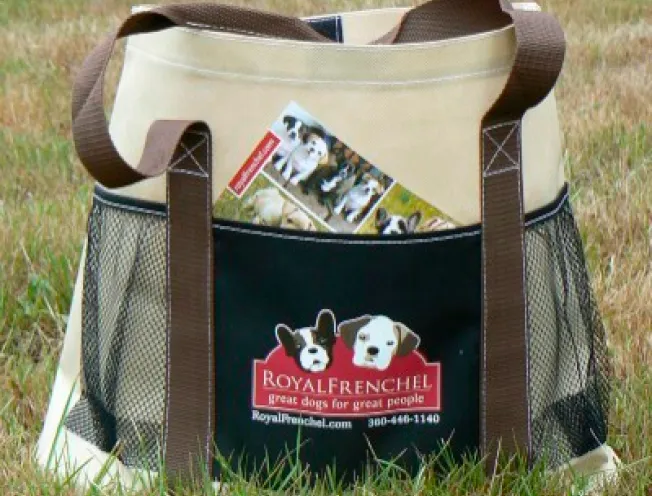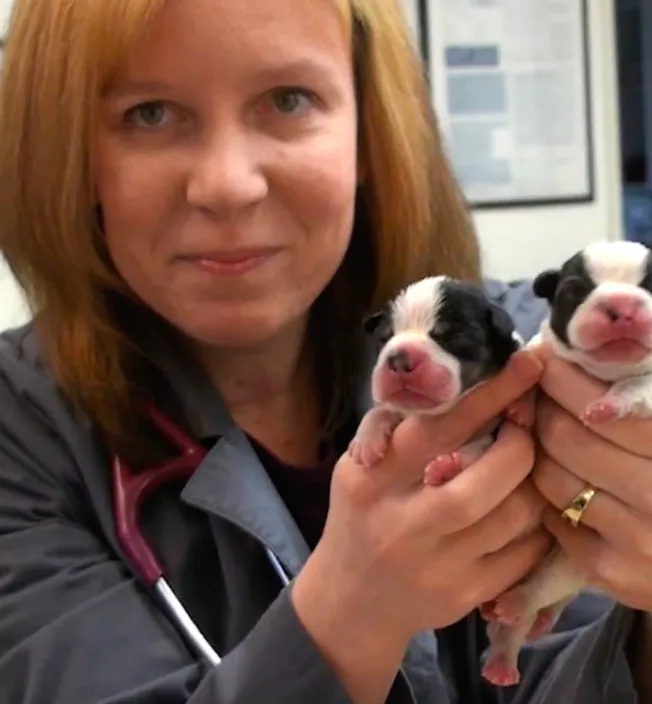Bedtime: Helping Your Puppy Rest, Reset, and Thrive
Your new Royal Frenchel puppy will need plenty of rest—much more than we do! On average, dogs sleep about 16 hours a day. Sleep is essential for your pup’s growth, brain development, and emotional well-being.
For this reason, we recommend keeping your schedule calm and home-focused for the first 3 days after bringing your puppy home. This restful environment helps reduce stress, supports potty training, and allows your puppy to settle into new relationships and routines.

Let Your Puppy Learn the Lay of the Land
The first days are all about your puppy getting comfortable with their new surroundings. This includes adjusting to new food and water, learning where their cozy dog bed is, and understanding when and where daily routines like eating and bathroom breaks happen.
Consistency is key—keeping regular sleep times, meal times, and outdoor potty breaks helps your puppy build confidence and feel secure. (For more on this,
check out our Daily Routine and Housebreaking Made Easy guide.)
Adjusting to Your Family’s Rhythm
Your puppy may be used to an 8:00 pm bedtime and a 6:00 am wake-up schedule, but they are flexible and can adapt smoothly to your family’s lifestyle—so long as the changes happen gradually and consistently. Abrupt shifts can confuse them and lead to accidents or whining, so small steps are best.
Crate Training: Your Puppy’s Safe Haven
Crating your pup until they’re fully housebroken is highly recommended. Far from being a “prison,” a crate is a cozy, secure den—a space your puppy can call their own. It provides structure, safety, and clarity in their day. The crates we use that we recommend are wire crates (20-24 inches, with two doors). They are easy to clean, comfortable, and fit nicely in your home. Once trained, your puppy can sleep comfortably with you but still enjoy retreating to their crate whenever they want quiet time.
We suggest keeping your puppy crated for at least one hour a day, five days a week, even after housebreaking. This helps reduce stress during visits to the vet or other times when crating might be necessary. It’s a much easier transition if your puppy is used to their crate ahead of time.
Making the Crate Cozy and Welcoming
Place the crate near your bed so your puppy doesn’t feel alone during those first nights. Dogs have a developed 6th sense so being close to you, even if they can’t see you is important because they can feel you! Cover it with a breathable cloth to create a snug, den-like atmosphere. Add a hoof or a safe chew treat to help them enjoy, relax and feel content.
If your pup cries at night, gently tap the crate’s top and whisper a calm “Nitey Nite.” Avoid extra fuss or loud noises—this helps your puppy learn to settle on their own. If crying persists, quietly take them outside for a quick bathroom break without any play or treats. The goal is to teach your puppy to sleep through the night without needing constant attention.
No Nighttime Treats or Games
Avoid rewarding nighttime cries with treats or play—this can encourage your puppy to “call you out” for attention, making it harder for everyone to get a good night’s sleep. Remember, your puppy has just left their pack and is experiencing a big environmental and social shift.
Be Kind, Yet Firm
Puppies, like children, respond best to consistent, loving guidance. If your pup truly needs something, provide it kindly. But if they are pushing boundaries or “testing” you, calmly but firmly maintain the routine. Puppies are smart and will quickly learn what works—so keep your cool, stay consistent, and trust the process.











